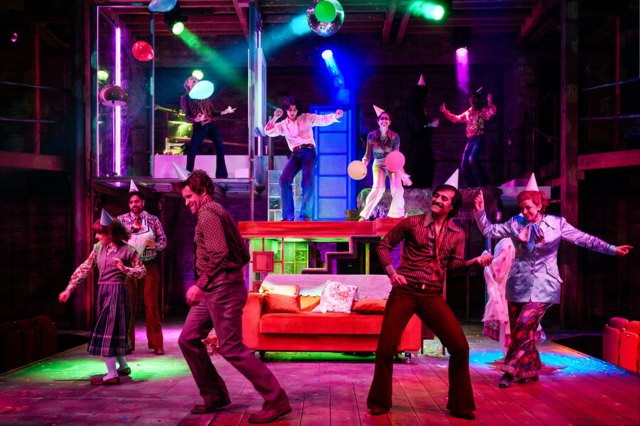The Buddha of Suburbia at the RSC’s Swan Theatre – review
The Wise Children co-production runs until 1 June

Hanif Kureishi’s 1990 debut novel was a literary sensation, and people of a certain vintage – such as this production’s director, Emma Rice – are prone to wax lyrical and nostalgic about its power to evoke a time, a place, a specific moment in their lives. I have to confess that, despite being of an approximate vintage, it passed me by completely.
I suspect that those who are familiar with the novel will derive much more satisfaction from Rice and Kureishi’s stage adaptation than those of us who are not. The picaresque, episodic whizz through locations, scenes and characters is not so much Dickensian as dizzying, with no time to breathe or explore character, delve into motivations or even to empathise with anyone along our hero Karim’s unlikely journey out of the south London suburbs in the late 1970s.
It’s all the more curious, then, that The Buddha of Suburbia should apparently be strongly autobiographical, since the figures drawn here are two-dimensional to the point of caricature and the novel’s acclaim for its skewering of a divided society on the cusp of Thatcher’s revolution is largely lost in translation. We’re simply left wondering why we should care about any of the self-serving characters, and why anyone thought it necessary to retell the story on a stage.
Having said all that, it’s done with great panache and plenty of Rice’s trademark theatricality, and there’s some chaotic, crude comedy along the way. Rachana Jadhav’s multi-level set and Vicki Mortimer’s vivid costumes certainly look the part and Niraj Chag’s delightful score plunders every possible aspect of the period’s music charts, from pop to punk and everything inbetween.
Dee Ahluwalia’s Karim narrates for the most part as his Indian-English family falls apart and is reconstructed in a more radical way, but he remains essentially unchanged by everything that happens to him, whether it’s life-affirming or tragic. A cast of players doubles, trebles and more as the supporting cast in his frenetic young life, and more than once Rice deploys metatheatrical tricks to win extra laughs.
Natasha Jayetileke wrings something interesting out of Karim’s best friend Jamila, and there are excellent performances from Ankur Bahl as his father and Ewan Wardrop as an eccentric theatre director with a sideline in sexual peccadilloes. The numerous intimate encounters are handled with a sense of raucous joy and liberation, and if it all ends up feeling a little like Confessions of an Anglo-Indian Actor, then at least that’s in keeping with the period, and a broad-minded audience probably isn’t going to mind too much.
The breakneck pace and relentless trajectory help nearly three hours fly by, and it’s easy to see why Rice’s biggest challenge must have been filleting the narrative to a manageable length. If you know the story, that may not matter too much. If you don’t, just try and keep up.
















